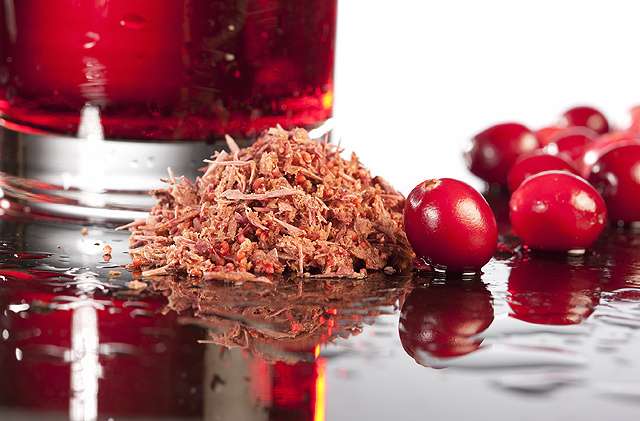Cranberry compound may help prevent urinary tract infections

A new bioactive compound present in cranberry juice that has the potential to control urinary tract infections (UTIs) was identified by Agricultural Research Service (ARS) scientists and collaborators. The compound they identified is purified from an extract of cranberry pulp and was found to inhibit Escherichia coli—the most common bacterial cause of UTIs—from sticking to human cells in laboratory tests.
A different compound, known as a "proanthocyanidin," also in cranberry juice, has long been recognized as a remedy for UTIs because it reduces the bacterial adhesion required for infections to take root.
The work was led by plant physiologist Arland Hotchkiss with colleagues at the ARS Eastern Regional Research Center in Wyndmoor, Pennsylvania, in collaboration with university and private-sector researchers. The work was supported by an agreement with Ocean Spray Cranberries, Inc., based in Lakeview, Massachusetts.
UTIs are the second most common type of infection in humans, leading to more than 8 million doctor visits annually, according to the National Center for Health Statistics. UTIs are generally defined by the number of organisms per milliliter of urine and are commonly treated with antibiotics. Natural substances that treat or prevent UTIs could be useful because antibiotics can lead to bacterial resistance.
In cranberries, the researchers studied the structure of plant compounds called xyloglucan oligosaccharides and identified the type referred to as "SSGG," which has the potential to help control UTIs. A study reporting the findings was published in the May 2015 issue of Journal of Agricultural and Food Chemistry.
ARS and Ocean Spray representatives have a recently approved patent application describing how to produce the cranberry xyloglucan oligosaccharides that have antiadhesive activity.
The xyloglucan oligosaccharides were purified from enzyme-treated cranberry pulp, the outer skin and material left over after juice is pressed out of cranberries. In laboratory experiments using test tubes and cell cultures, the researchers tested cranberry xyloglucan oligosaccharide's ability to interfere with the attachment of specific bacterial strains to urinary tract cells. They found that xyloglucan oligosaccharides inhibited the adhesion of E. coli strains to human bladder epithelial cells and human colonic epithelial cells.
"These cranberry xyloglucan oligosaccharides do not contain proanthocyanidin, so they have the potential to provide the consumer with another bioactive food ingredient to control UTIs," says Hotchkiss. "We think cranberry xyloglucan oligosaccharides have the potential to block the adhesion of E. coli in the urinary tract and gastrointestinal system. Xyloglucan SSGG oligosaccharides have been reported previously in other plants, but this is the first report for cranberry."
The efficacy of cranberry xyloglucan SSGG oligosaccharides can now be tested in human clinical trials. "We are still testing the efficacy of SSGG in various concentrations and we also want to test whether there is synergistic activity between proanthocyanidin and xyloglucan oligosaccharides," said co-author Christina Khoo, with Ocean Spray.
More information: Arland T. Hotchkiss et al. Cranberry Xyloglucan Structure and Inhibition of Adhesion to Epithelial Cells , Journal of Agricultural and Food Chemistry (2015). DOI: 10.1021/acs.jafc.5b00730















